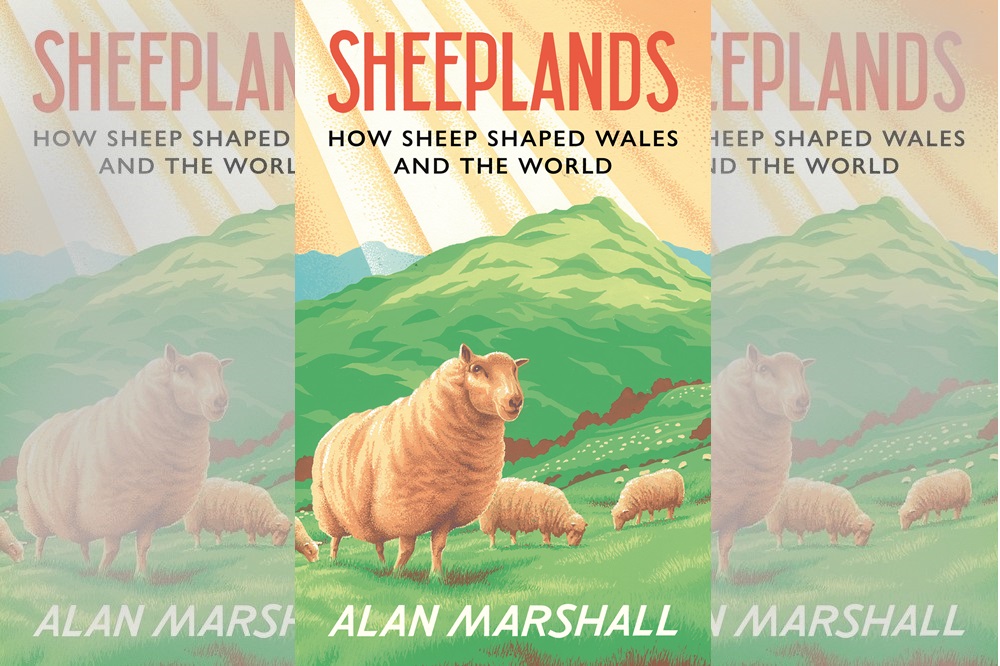Book review: Sheeplands by Alan Marshall

Myfanwy Alexander
If you are heading down to Builth Wells next week for the Royal Welsh Show, have you chosen your reading matter to pack?
It’s always a good idea to have a book or two with you for those moments when you wake up at 2am and realize your accommodation is rather closer to the Young People’s Village than you had thought and you are rather long in the tooth to leap up and run over to join the Foam Party.
Top of your Royal Welsh reads should be ‘Sheeplands,’ Alan Marshall’s joyous celebration of those woolly pillars of the rural economy. As you can tell from the subtitle ‘How Sheep Shaped Wales and the World,’ this is a book of epic scope, as we follow the winding track which leads back into the mists of history and the furthest corners of the globe.
Passion
We live in a golden age for non-fiction and, for me, the success of such books lies not so much in the craft of the writing but the passion which lies behind them. When you read Mike Parker on the Borderlands or Carwyn Graves on Welsh food, you are spending time with people passionate about their subjects and Marshall falls into this category: he can scarcely wait to share another ovine fact with his audience.
There is a lively, almost breathless tone to his writing, with necessarily brief historical vignettes interspersed by his own observations of his travels throughout Wales, uncovering the role sheep have played in our national story.
Hysteria
I should perhaps admit that I am not neutral on this subject, as I live in a community as dependant on one industry as the towns which have become America’s rustbelt. I’ve also done a fair bit of hands-on farmwork in my time so I do not need convincing about the influence of sheep on Welsh rural life and I have been impelled to take to the public prints to respond to the shrill anti-ovine hysteria of some eco-colonialists.
But Marshall’s book, though it puts a well-judged hoof into the current controversy whereby sheep are described as the ‘woolly maggots’ responsible for the soi-disant ‘green desert,’ ranges far wider, both in time and geographically.
And yet you do not have to be interested in sheep to enjoy this book. It fits firmly in a modern historiographical trend to examine the past from a fresh focus, like Peter Frankopan’s ‘The Earth Transformed’ or Kyle Harper’s epidemiological masterpiece ‘Plagues Upon the Earth.’ Like these works, ‘Sheeplands’ both tells you things you previously knew nothing about, such as the Garut fighting sheep of Java, and gives fresh perspectives on more familiar material, reminding us that wool funded not only the Hundred Years War but also Columbus’ expedition to the New World.
It’s a wild ride, from Ur of the Chaldees to Llanidloes, and Marshall has chunked up his research into distinct chapters, suitable for browsers as well as the cover-to-cover reader. That having been said, I would recommend reading every word, simply because you may not know you are interested in one of the many topics until you have heard the details.
The mysterious death of the first sheep in New Zealand, the bloody war between shepherds and cattlemen in the Wild West which has, thus far, failed to make its way into Westerns and the contemporary depredations of sheep- rustling jihadis, all are engaging tales well told.
Characters
The text bristles with well-drawn characters. We can never be reminded often enough that the Welsh colony in Patagonia didn’t really get going until experienced farmers and their sheep arrived on the second boat. John Macarthur, in Australia’s penal days, was an entrepreneur who paid his workers with rum with consequences which can well be imagined and introduced Merino sheep to the colony. And who can forget the John G Edwards, the undisputed Sheep King of America? This book contains material for at least a dozen biopics.
Marshall is accompanied on his travels through Wales by his young son, Shelley. As a rule, I find reading about other people’s children about as engaging as hearing them recount their dreams but Marshall deploys Shelley with charm and restraint and his presence provides a deft balance between past and future as well as light relief.
Versatile creature
Shifting the focus between Wales and the wider world provides this story with scope and the extended timescale tells us how we have arrived at the present close connection between Welsh people and their sheep, a connection so fabled that it has, of course, generated an enduring slur.
Alan Marshall has done us a favour by reminding us why this versatile creature has come to dominate our countryside as well as providing thoughts on how sheep can be deployed as an ecological benefit so that for generations to come, we will walk on our hills we will, like R S Thomas, not be alone:
‘Sheep sang round me in the strong light.’
Sheeplands: How Sheep Shaped Wales and the World by Alan Marshall is published by Calon. It is available from all good bookshops.
Support our Nation today
For the price of a cup of coffee a month you can help us create an independent, not-for-profit, national news service for the people of Wales, by the people of Wales.






‘The sheep sang around me’ if you have heard the various noises sheep make overnight on the hill you would hardly call it singing…
A rather pungent memory, this has come in at no 1 on my reading list, I hope he left the warts in…